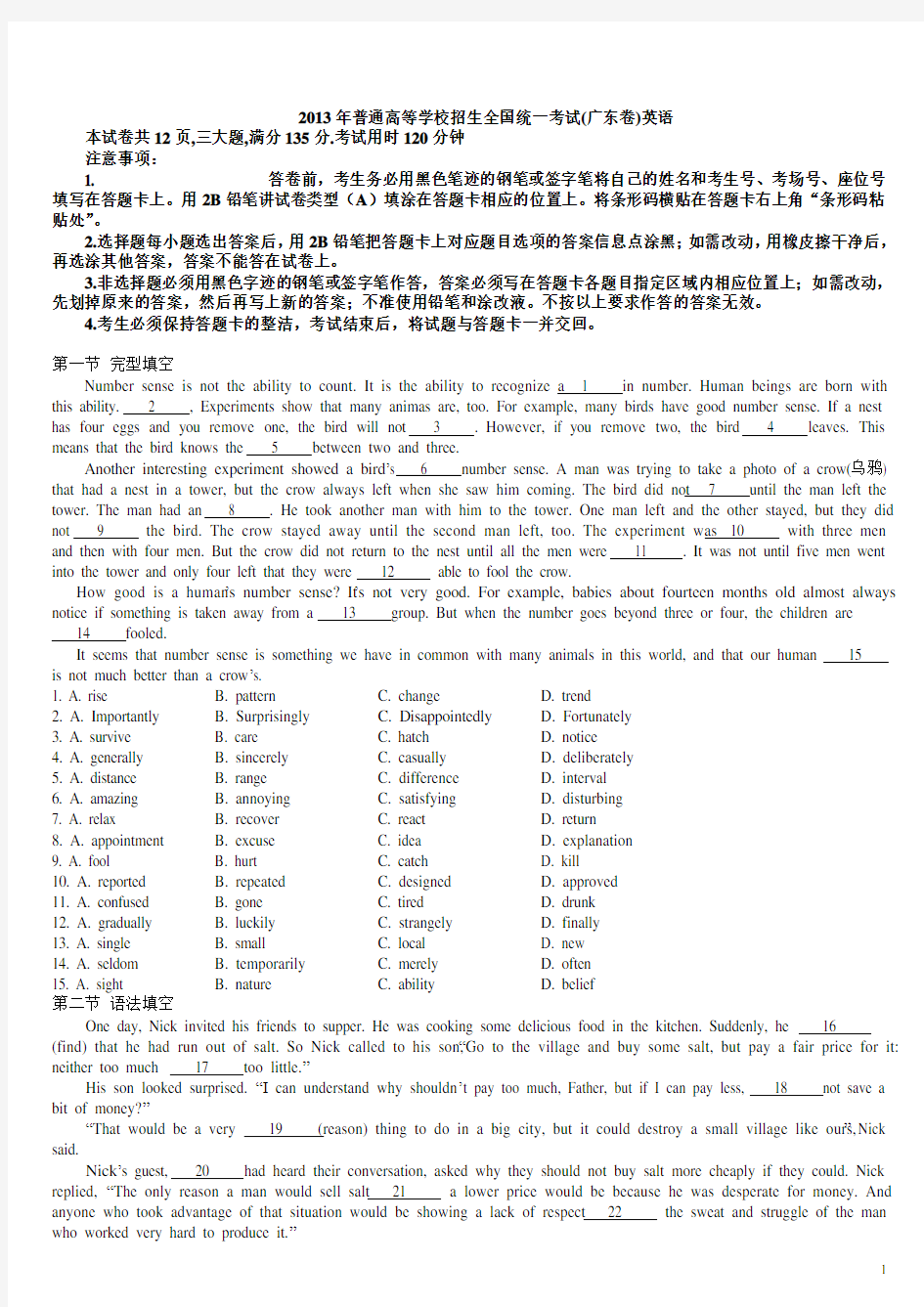2013广东高考英语试题及答案(详细版)

- 1、下载文档前请自行甄别文档内容的完整性,平台不提供额外的编辑、内容补充、找答案等附加服务。
- 2、"仅部分预览"的文档,不可在线预览部分如存在完整性等问题,可反馈申请退款(可完整预览的文档不适用该条件!)。
- 3、如文档侵犯您的权益,请联系客服反馈,我们会尽快为您处理(人工客服工作时间:9:00-18:30)。
2013年普通高等学校招生全国统一考试(广东卷)英语
本试卷共12页,三大题,满分135分.考试用时120分钟
注意事项:
1. 答卷前,考生务必用黑色笔迹的钢笔或签字笔将自己的姓名和考生号、考场号、座位号填写在答题卡上。用2B铅笔讲试卷类型(A)填涂在答题卡相应的位置上。将条形码横贴在答题卡右上角“条形码粘贴处”。
2.选择题每小题选出答案后,用2B铅笔把答题卡上对应题目选项的答案信息点涂黑;如需改动,用橡皮擦干净后,再选涂其他答案,答案不能答在试卷上。
3.非选择题必须用黑色字迹的钢笔或签字笔作答,答案必须写在答题卡各题目指定区域内相应位置上;如需改动,先划掉原来的答案,然后再写上新的答案;不准使用铅笔和涂改液。不按以上要求作答的答案无效。
4.考生必须保持答题卡的整洁,考试结束后,将试题与答题卡一并交回。
第一节完型填空
Number sense is not the ability to count. It is the ability to recognize a 1 in number. Human beings are born with this ability. 2 , Experiments show that many animas are, too. For example, many birds have good number sense. If a nest has four eggs and you remove one, the bird will not 3 . However, if you remove two, the bird 4 leaves. This means that the bird knows the 5 between two and three.
Another interesting experiment showed a bird’s 6 number sense. A man was trying to take a photo of a crow(乌鸦) that had a nest in a tower, but the crow always left when she saw him coming. The bird did not 7 until the man left the tower. The man had an 8 . He took another man with him to the tower. One man left and the other stayed, but they did not 9 the bird. The crow stayed away until the second man left, too. The experiment was 10 with three men and then with four men. But the crow did not return to the nest until all the men were 11 . It was not until five men went into the tower and only four left that they were 12 able to fool the crow.
How good is a human’s number sense? It’s not very good. For example, babies about fourteen months old almost always notice if something is taken away from a 13 group. But when the number goes beyond three or four, the children are
14 fooled.
It seems that number sense is something we have in common with many animals in this world, and that our human 15
is not much better than a crow’s.
1. A. rise B. pattern C. change D. trend
2. A. Importantly B. Surprisingly C. Disappointedly D. Fortunately
3. A. survive B. care C. hatch D. notice
4. A. generally B. sincerely C. casually D. deliberately
5. A. distance B. range C. difference D. interval
6. A. amazing B. annoying C. satisfying D. disturbing
7. A. relax B. recover C. react D. return
8. A. appointment B. excuse C. idea D. explanation
9. A. fool B. hurt C. catch D. kill
10. A. reported B. repeated C. designed D. approved
11. A. confused B. gone C. tired D. drunk
12. A. gradually B. luckily C. strangely D. finally
13. A. single B. small C. local D. new
14. A. seldom B. temporarily C. merely D. often
15. A. sight B. nature C. ability D. belief
第二节语法填空
One day, Nick invited his friends to supper. He was cooking some delicious food in the kitchen. Suddenly, he 16 (find) that he had run out of salt. So Nick called to his son, “Go to the village and buy some salt, but pay a fair price for it: neither too much 17 too little.”
His son looked surprised. “I can understand why shouldn’t pay too much, Father, but if I can pay less, 18 not save a bit of money?”
“That would be a very 19 (reason) thing to do in a big city, but it could destroy a small village like ours,” Nick said.
Nick’s guest, 20 had heard their conversation, asked why they should not buy salt more cheaply if they could. Nick replied, “The only reason a man would sell salt 21 a lower price would be because he was desperate for money. And anyone who took advantage of that situation would be showing a lack of respect 22 the sweat and struggle of the man who worked very hard to produce it.”
